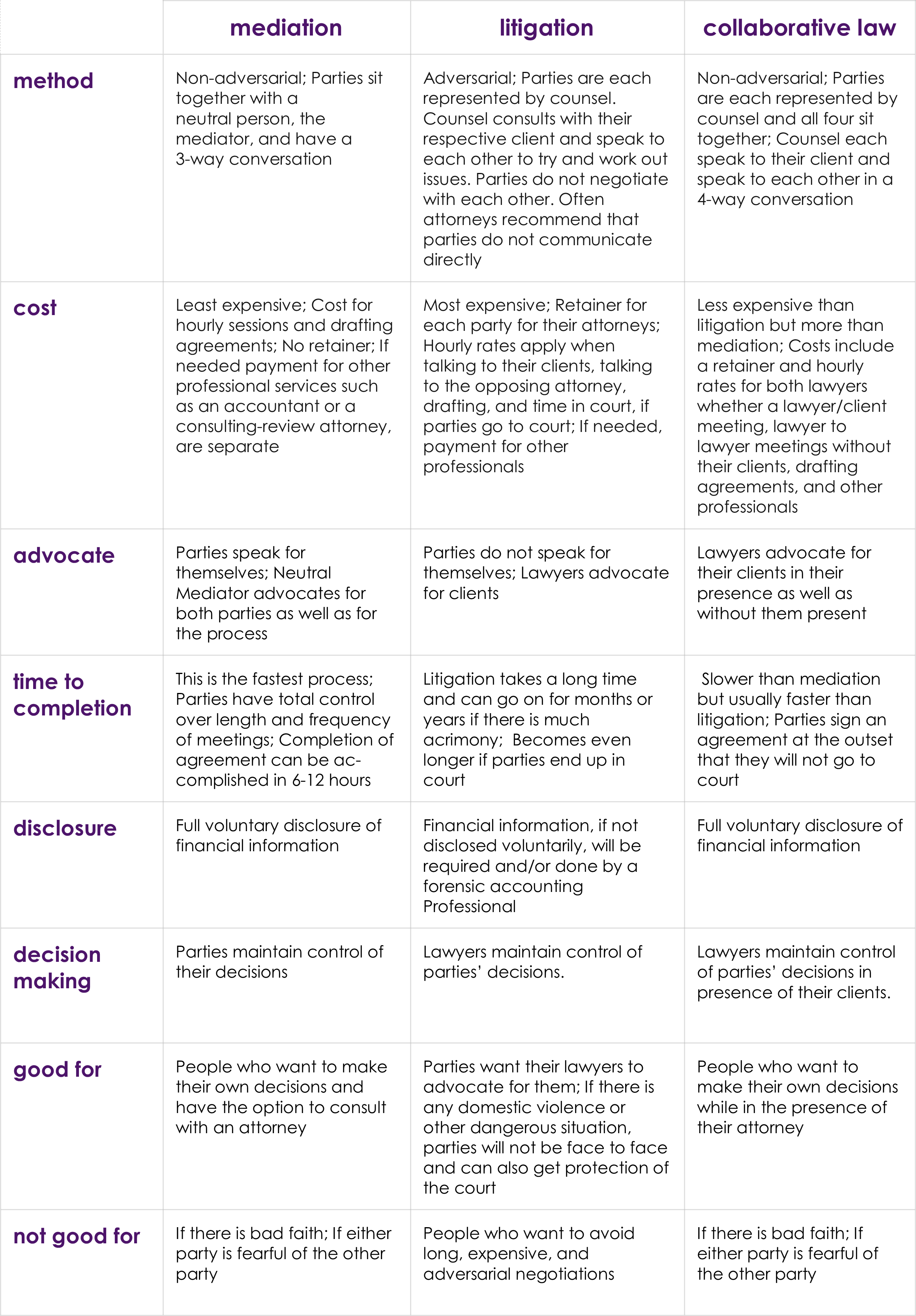|
|
mediation |
litigation |
collaborative law |
 |
| method |
 Non-adversarial; Parties sit together with a neutral person, the mediator, and have a 3-way conversation Non-adversarial; Parties sit together with a neutral person, the mediator, and have a 3-way conversation |
 Adversarial; Parties are each represented by counsel. Counsel consults with their respective client and speak to each other to try and work out issues. Parties do not negotiate with each other. Often attorneys recommend that parties do not communicate directly Adversarial; Parties are each represented by counsel. Counsel consults with their respective client and speak to each other to try and work out issues. Parties do not negotiate with each other. Often attorneys recommend that parties do not communicate directly |
Non-adversarial; Parties are each represented by counsel and all four sit together; Counsel each speak to their client and speak to each other in a 4-way conversation |
 |
| cost |
 Least expensive; Cost for hourly sessions and drafting agreements; No retainer; If needed payment for other professional services such as an accountant or a consulting-review attorney, are separate Least expensive; Cost for hourly sessions and drafting agreements; No retainer; If needed payment for other professional services such as an accountant or a consulting-review attorney, are separate |
 Most expensive; Retainer for each party for their attorneys; Hourly rates apply when talking to their clients, talking to the opposing attorney, drafting, and time in court, if parties go to court; If needed, payment for other professionals Most expensive; Retainer for each party for their attorneys; Hourly rates apply when talking to their clients, talking to the opposing attorney, drafting, and time in court, if parties go to court; If needed, payment for other professionals |
Less expensive than litigation but more than mediation; Costs include a retainer and hourly rates for both lawyers whether a lawyer/client meeting, lawyer to lawyer meetings without their clients, drafting agreements, and other professionals
|
 |
| advocate |
 Parties speak for themselves; Neutral mediator advocates for both parties as well as for the process Parties speak for themselves; Neutral mediator advocates for both parties as well as for the process |
 Parties do not speak for themselves; Lawyers advocate for clients Parties do not speak for themselves; Lawyers advocate for clients |
Lawyers advocate for their clients in their presence as well as without them present |
 |
| time to completion |
 This is the fastest process; Parties have total control over length and frequency of meetings; Completion of agreement can be accomplished in 6-12 hours This is the fastest process; Parties have total control over length and frequency of meetings; Completion of agreement can be accomplished in 6-12 hours |
 Litigation takes a long time and can go on for months or years if there is much acrimony; Becomes even longer if parties end up in court Litigation takes a long time and can go on for months or years if there is much acrimony; Becomes even longer if parties end up in court |
Slower than mediation but usually faster than litigation; Parties sign an agreement at the outset that they will not go to court |
 |
| disclosure |
 Full voluntary disclosure of financial information Full voluntary disclosure of financial information |
 Financial information, if not disclosed voluntarily, will be required and/or done by a forensic accounting professional Financial information, if not disclosed voluntarily, will be required and/or done by a forensic accounting professional |
Full voluntary disclosure of financial information |
 |
| decision making |
 Parties maintain control of their decisions Parties maintain control of their decisions |
 Lawyers maintain control of parties’ decisions. Lawyers maintain control of parties’ decisions. |
Lawyers maintain control of parties’ decisions in presence of their clients. |
 |
| good for |
 People who want to make their own decisions and have the option to consult with an attorney People who want to make their own decisions and have the option to consult with an attorney |
 Parties want their lawyers to advocate for them; If there is any domestic violence or other dangerous situation, parties will not be face to face and can also get protection of the court Parties want their lawyers to advocate for them; If there is any domestic violence or other dangerous situation, parties will not be face to face and can also get protection of the court |
People who want to make their own decisions while in the presence of their attorney |
 |
| not good for |
 If there is bad faith; If either party is fearful of the other party If there is bad faith; If either party is fearful of the other party |
 People who want to avoid long, expensive, and adversarial negotiations People who want to avoid long, expensive, and adversarial negotiations |
If there is bad faith; If either party is fearful of the other party |

Mediation = Saving You Both Potentially Tens of Thousands of Dollars:




